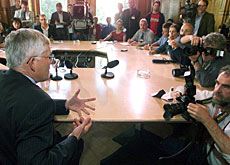Kaspar Villiger quits the cabinet

The finance minister, Kaspar Villiger, has resigned from the cabinet after 14 years.
The Radical Party politician – who served twice as president – headed up both the defence and later the finance ministry during his term in office. His successor will be elected by parliament in December.
He was widely regarded as a competent and discreet member of government.
Villiger’s resignation, which was announced on Tuesday by the Federal Chancellery, had been expected for more than a year. But whenever a cabinet member departs, it creates a minor sensation in the Swiss political world.
The government consists of just seven ministers, and resignations are a fairly rare event.
On average, a government member remains in office for almost ten years. Villiger exceeded this time span by four years.
A quiet man
But staying power is not his only quality.
Discretion and respect for his office will ensure that Villiger sees out his term, remaining until the present legislature comes to its end in December in a demonstration of old-fashioned good manners.
Over the past 20 years, almost all his colleagues have adopted a different strategy: resigning halfway through their term or, even better, just before a general election, to allow potential successors to come to the fore and so boost the image of their political party.
The finance minister, however, did not want to create a stir. According to a French-speaking commentator, Villiger is a “person of integrity: calm, hardworking, conscientious; he has made prudence a cardinal virtue”.
Reforming the army
When Villiger was elected in 1989, public attention was focused on the forced resignation of his predecessor.
Elisabeth Kopp – in charge of the justice ministry and the first woman ever to hold such power in Switzerland – had been at the centre of a political scandal.
In the wake of the Kopp case, the Radical Party lost its control of the justice ministry. Villiger had to be content with the defence ministry, an office traditionally regarded as less influential.
But Villiger immediately made headway in the field entrusted to him.
Without drawing down on himself the wrath of the Right, and at the same time earning the respect of the Left, he brought about a profound change in Switzerland’s system of national defence.
Discharging a debt
In 1995 this former minor industrialist moved to the finance ministry. And immediately he had to deal with the scandal of Nazi gold and dormant Jewish accounts from the war period.
Pressure from Jewish organisations finally resulted in official apologies and the payment of compensation. As Swiss president that year, it fell to Villiger to act as the cabinet’s spokesman.
He carried it off with dignity, settling Switzerland’s debt with history.
But then public attention returned to the country’s ailing economy, and the solutions he proposed did not meet with universal approval.
Problems with parliament
Characterised by competence and restraint, Villiger was the strong man of federal politics during the 1990s. But observers point out that in a number of situations his directness was crushed by the machinations of the new, more strident, brand of politics.
One example is that for years he strongly defended the principle of inheritance tax, but then gave way to the demands of his own party, suddenly presenting its abolition as a possible option.
In the past few years, the political and economic climate has indeed changed.
One of a generation of politicians brought up on conciliation and economic growth, Villiger has always worked for unity and consensus. But parliament and public opinion are no longer so easily persuaded as in the past.
At least his compromise to protect banking secrecy, with a tax at source on foreign deposits, met with approval in Bern and kept Brussels at bay.
Succession race
Although Villiger’s successor will not be elected until December, the race for his coveted post is already well underway and will most probably go to someone from the German-speaking part of Switzerland.
Christine Beerli, a 50-year old from Biel and member of the Senate for the past 12 years, is one of the favourites to take over from Villiger.
But the fact that she – like another cabinet minister, Samuel Schmid – comes from canton Bern could stand in her way, as the government strives to have a broad geographic representation.
Franz Steinegger, a 60-year old long-time parliamentarian from canton Uri, is another strong candidate. His reputation for keeping his cool during crises has earned him the nickname of “Catastrophe Franz.” But, in his case, his age could count against him.
Marianne Durst, a parliamentarian from canton Glarus, has been campaigning for the post to go to a female candidate and might herself be in with a chance.
Meanwhile, two candidates with financial backgrounds, Gerold Bührer from canton Schaffhausen and Rudolf Merz from Appenzell, are also vying for the post.
swissinfo
Kaspar Villiger was born on February 5, 1941.
On the death of his father, Villiger, then aged just 25, took over the management of the family’s cigar factory, Villiger & Sons, near Lucerne.
He expanded the firm by buying a bicycle factory in Buttisholz.
He was elected to the government in February 1989.
The Radical politician from canton Lucerne was twice Swiss president – in 1995 and 2002.
From 1989 to 1995, Villiger was in charge of the defence ministry.
From 1995 until 2003, he headed the finance ministry.

In compliance with the JTI standards
More: SWI swissinfo.ch certified by the Journalism Trust Initiative










You can find an overview of ongoing debates with our journalists here . Please join us!
If you want to start a conversation about a topic raised in this article or want to report factual errors, email us at english@swissinfo.ch.